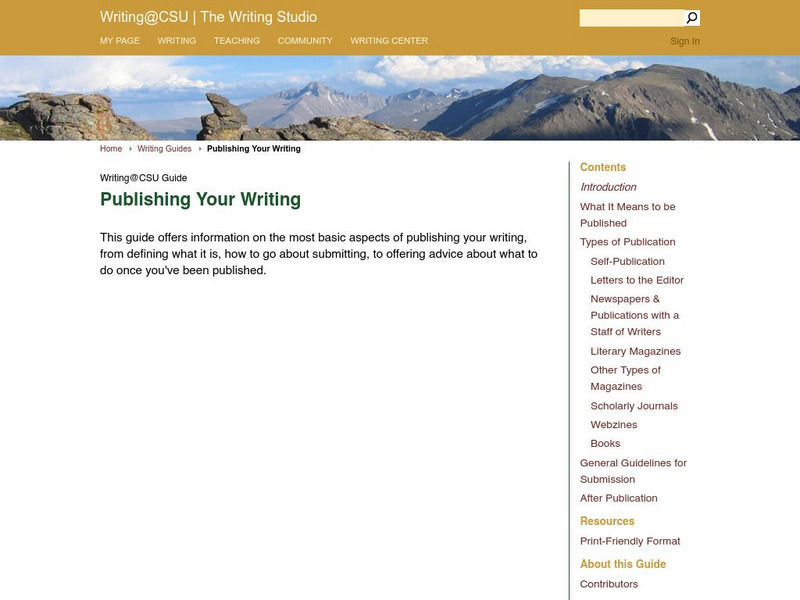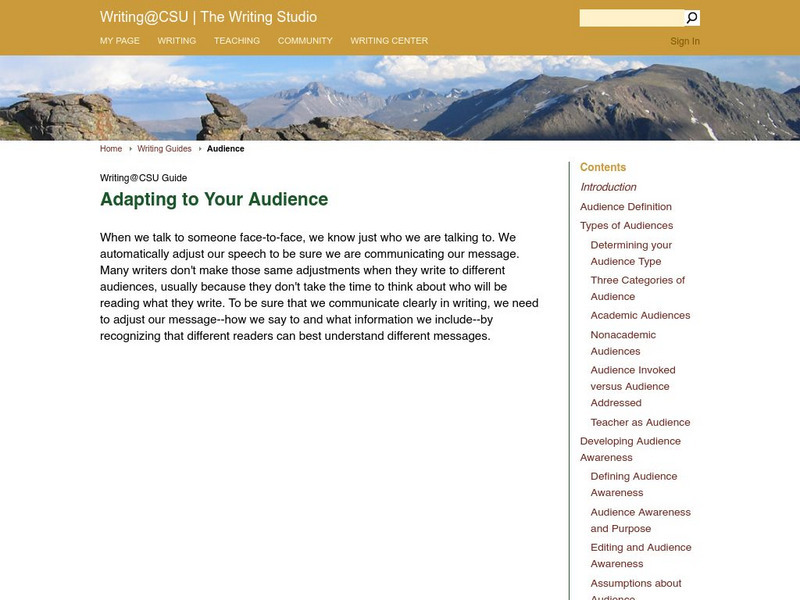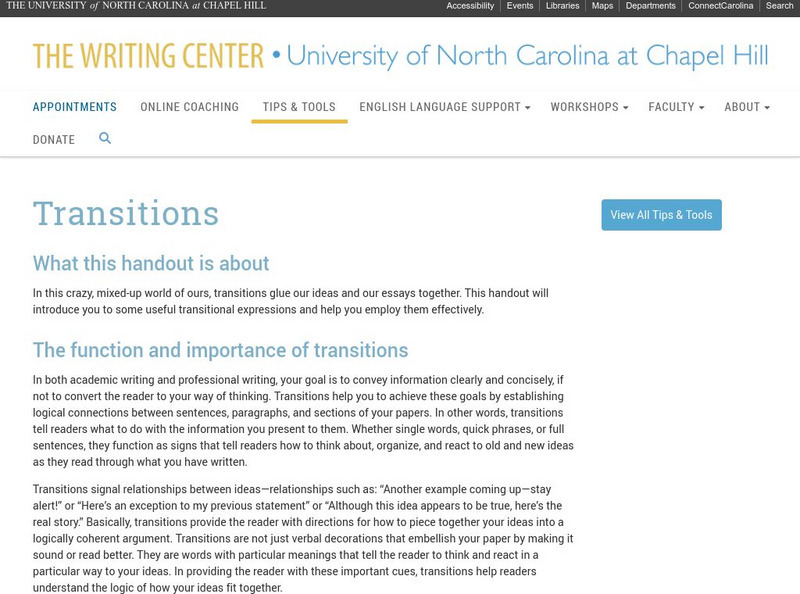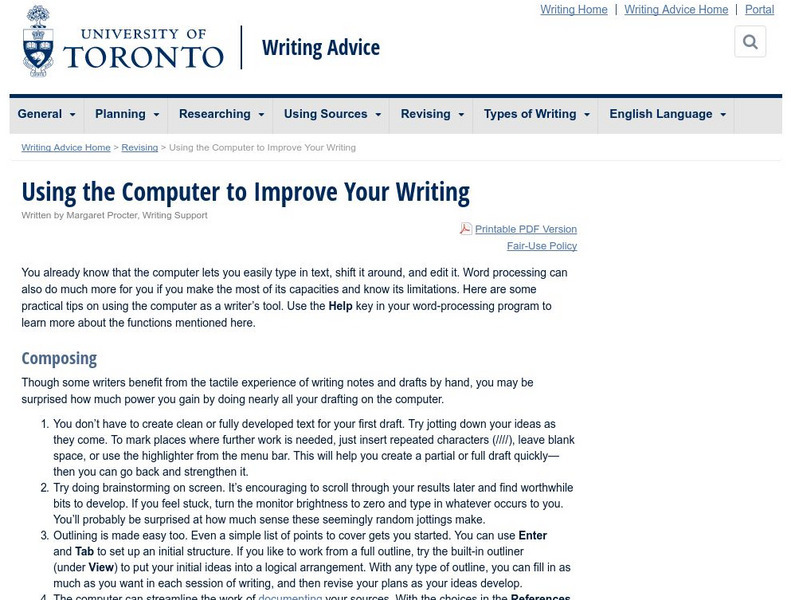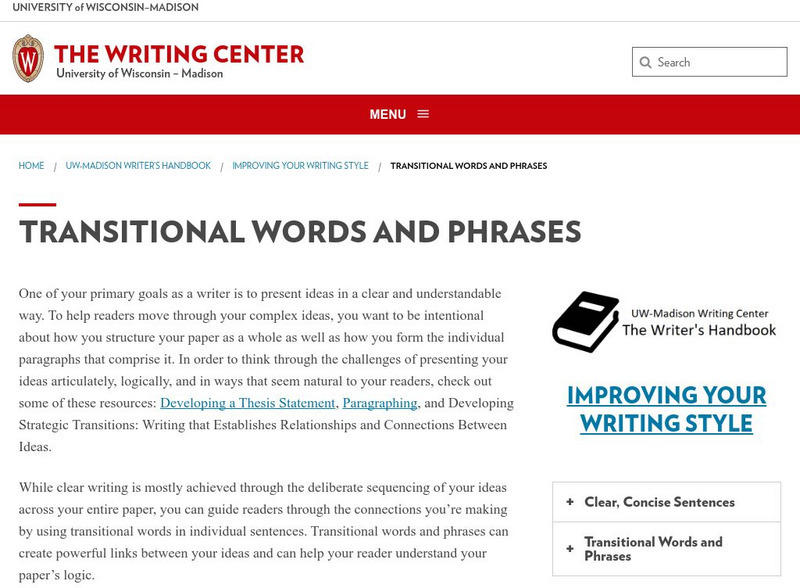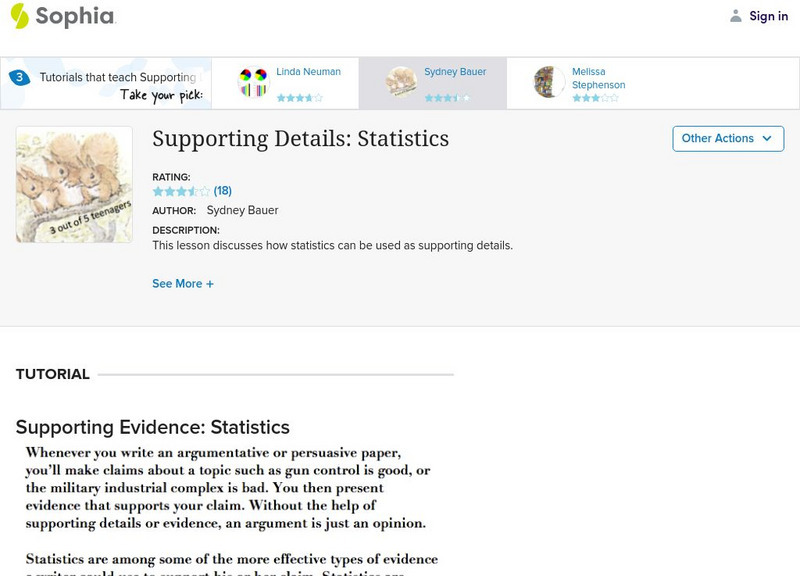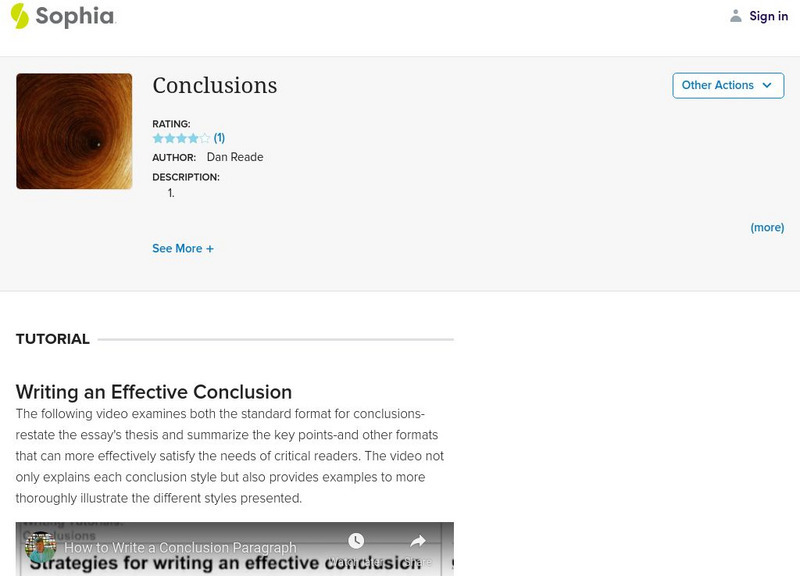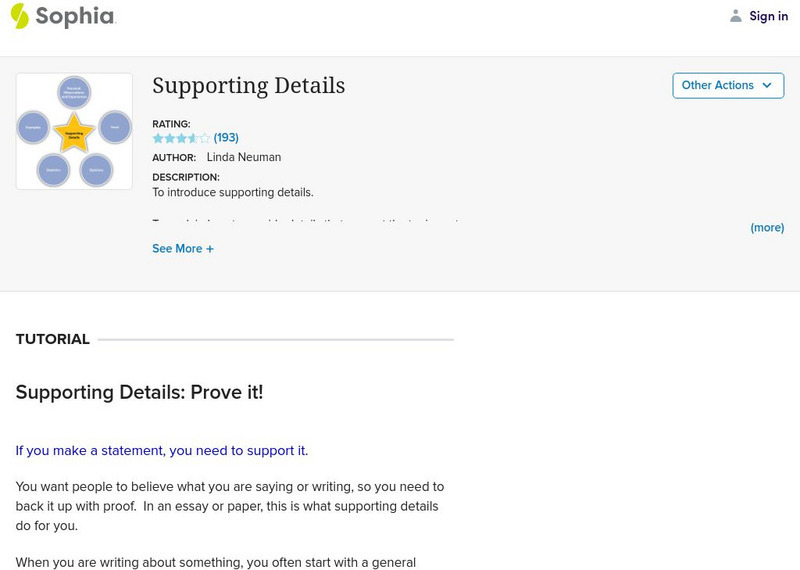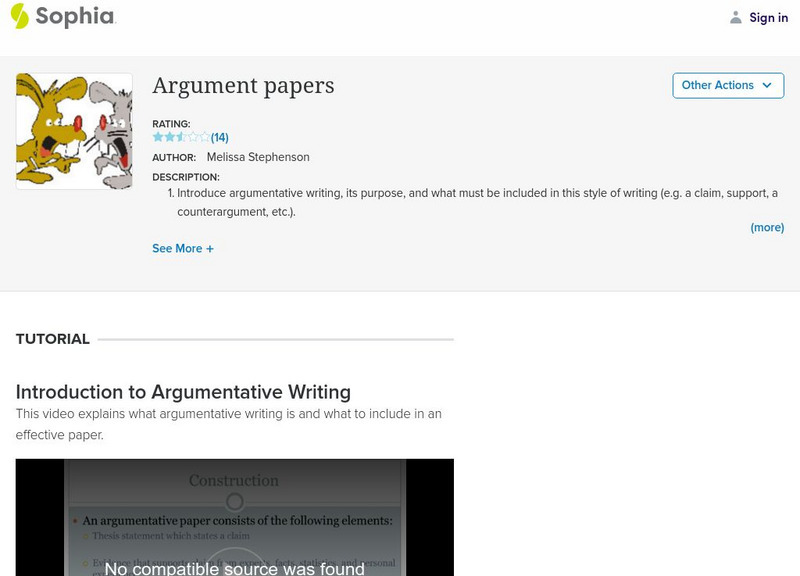Colorado State University
Colorado State Writing Center: Publishing Your Writing
A basic guide concerning how to go about publishing your writing. Includes information about what it means to be published, publication types, and guidelines for submission. CCSS.ELA-Literacy.CCRA.W.6
Online Writing Lab at Purdue University
Purdue University Owl: Avoiding Plagiarism
Plagiarism is a serious offense in many educational settings. Plagiarism and copyright laws are reviewed here. Activities to avoid plagiarism are also provided through links. W.9-10.8 Sources, W.11-12.8 Sources/Integrate/Cite;...
Colorado State University
Colorado State Writing Center: Adapting to Your Audience
A clear guide to understanding the audience for your writing, this site leads you through steps to help you identify your audience, then structure your writing to meet that audience's needs and expectations. Use links on the right....
Other
Tesol: Helping Students Understand That Written and Spoken English Are Different
This in-depth article analyzes how teachers can effectively teach students that written language does not always correspond to spoken language. Sample lesson ideas are included. SL.9-10.6 Adapt to task/formal. CCSS.ELA-Literacy.CCRA.L.1,...
BBC
Bbc: Skillswise: Speaking and Listening: Formal and Informal Speaking
This Skillswise site focuses on formal and informal speaking. Included are a video about how to decide whether to use formal or informal speech, fact sheets and worksheets for instruction. The Skillswise sites from BBC are geared to...
University of North Carolina
University of North Carolina: Writing Transitions
This University of North Carolina writing tutorial gives examples and how to use transitions and stresses the importance of organization. W.9-10.1c cohesion/clarity/reason, W.9-10.2c cohesion/clarity/trans, W.11-12.1c...
Colorado State University
Colorado State Writing Center: Understanding Your Purpose
Use the links on the right to get a better understanding of purpose in writing including the types of purposes and how audience affects purpose. Click on Purpose and Audience and Purpose and Strategies. W.9-10.4 Write/Audience/Purpose;...
Online Writing Lab at Purdue University
Purdue University Owl: Mla Formatting and Style Guide
Extensive examination of the Modern Language Association (MLA) format of writing papers, making reference to the works of others, citations, and notes. W.9-10.8 Sources, L.9-10.3a Standard Format; CCSS.ELA-Literacy.WHST.6-8.8 Gather...
Online Writing Lab at Purdue University
Purdue University Owl: Using American Psychological Association (Apa) Format
Extensive information on how to use the American Psychological Association (APA) format for citations. Information is provided on general format, referring to other works, reference list, notes, and examples in the APA format. W.9-10.8...
Texas Education Agency
Texas Gateway: Formal Writing Across the Content Areas
This resource explores instructional practices for incorporating formal writing into English language arts, mathematics, science, and social studies instruction. CCSS.ELA-Literacy.WHST.6-8.1.d
University of Toronto (Canada)
University of Toronto: Using Computers to Improve Your Writing
Tips from the University of Toronto on using word processing features as aids in composing and revising papers. W.9-10.6 Technology, CCSS.ELA-Literacy.CCRA.W.6, W.11-12.6 Technology
Other
Acronym Finder: Abbreviations and Acronyms Dictionary
Journalists are inundated with acronyms. This site contains 240,000 of them and their meanings. Search tool allows you to enter the exact acronym or the first letter. You can even enter a keyword and look for acronyms that include it....
Other
Six Minutes: Speech Analysis #1: How to Study and Critique a Speech
Dlugen presents a detailed collection of tips to observe when critiquing others' speeches. This skill is critical in improving individual presentation abilities. SL.9-10.3 Eval Presentation. CCSS.ELA-Literacy.CCRA.SL.3, SL.9-10.3 Eval...
PBS
Pbs: Academic Vocabulary in the Common Core: Disciplinary Vocabulary
This series of four video segments features a social studies teacher and a chemistry teacher demonstrating the integration of academic vocabulary into their classrooms. These segments feature the incorporation of general vocabulary (Tier...
Sophia Learning
Sophia: Reading Comprehension and Classroom Discussions
This tutorial focuses on active reading comprehension strategies including reading aloud, taking notes, summarizing, and writing in the margins of books to improve retention and class discussion. It includes two Flickr videos on active...
University of Wisconsin
University of Wisconsin: Using Transitions: Transitional Words and Phrases
Tables of words that show different types of sentence transitions. W.9-10.1c cohesion/clarity/reason, W.9-10.2c cohesion/clarity/transitions. CCSS.ELA-Literacy.CCRA.W.4, W.11-12.1c Transitions/Cohesion, W.11-12.2c Transition/Cohesion....
Sophia Learning
Sophia: Supporting Details: Statistics
This lesson focuses on using statistics as supporting details. It explains why statistics make powerful supporting details, however, these can be skewed to show different outcomes. It suggests looking carefully when using statistics to...
University of Richmond
University of Richmond: Using Transitions
A discussion of how to use transitions for effective writing. W.9-10.2c cohesion/clarity/trans, W.11-12.1c Transitions/Cohesion, W.11-12.2c Transition/Cohesion CCSS.ELA-Literacy.WHST.6-8.2.c
Sophia Learning
Sophia: Conclusions
A screencast lesson defining a conclusion and discussing how to write an effective conclusion. Students learn the traditional conclusion format as well as other formats that may better fit a writer's topic and purpose. Includes a section...
Sophia Learning
Sophia: Supporting Details
This tutorial focuses on supporting details using a video of a paragraph from a book showing the topic sentence and two strong, reliable, supporting details. This is followed by a slideshow that stresses the need for variety in the types...
Pennsylvania State University
Pennsylvania State University (Dr. Mc Clennen): How to Do a Close Reading
This guide is written for college students, but should be very useful for upper level high school students as well. The writer first describes fourteen steps to take in doing a close reading, then provides six pieces of advice on how to...
Sophia Learning
Sophia: Research Questions: A Focus for Planning, Researching, and Writing
This Sophia video lesson introduces how to develop good questions for a research paper. CCSS.ELA-Literacy.CCRA.W.8; CCSS.ELA-Literacy.WHST.6-8.7 Conduct short research projects. CCSS.ELA-Literacy.WHST.6-8.7 standards are addressed in...
Capital Community College Foundation
Guide to Grammar and Writing: Principles of a Composition
Writing a Paper? Here at the Capital Community College is everything you could ever ask for while preparing your essay. This site includes the writing process, structure, thesis statement, transitions, the computer as a writing...
Sophia Learning
Sophia: Argument Papers
A series of six screencast lessons explaining the process of argumentative writing. The first [4 min. 22 sec.] focuses on overall structure and purpose. The second [6 mins, 18 secs] explains how to state a claim. The third [6 min. 3...
